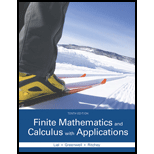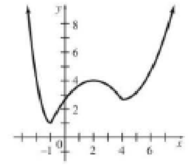
Finite Mathematics and Calculus with Applications (10th Edition)
10th Edition
ISBN: 9780321979407
Author: Margaret L. Lial, Raymond N. Greenwell, Nathan P. Ritchey
Publisher: PEARSON
expand_more
expand_more
format_list_bulleted
Concept explainers
Textbook Question
Chapter 13.1, Problem 1YT
Find where the function is increasing and decreasing.

Expert Solution & Answer
Want to see the full answer?
Check out a sample textbook solution
Students have asked these similar questions
A 20 foot ladder rests on level ground; its head (top) is against a vertical wall. The bottom of the ladder begins by being 12 feet from the wall but begins moving away at the rate of 0.1 feet per second. At what rate is the top of the ladder slipping down the wall? You may use a calculator.
Explain the focus and reasons for establishment of 12.4.1(root test) and 12.4.2(ratio test)
use Integration by Parts to derive 12.6.1
Chapter 13 Solutions
Finite Mathematics and Calculus with Applications (10th Edition)
Ch. 13.1 - Find where the function is increasing and...Ch. 13.1 - Prob. 2YTCh. 13.1 - Prob. 3YTCh. 13.1 - Prob. 4YTCh. 13.1 - Prob. 1WECh. 13.1 - Prob. 2WECh. 13.1 - Prob. 3WECh. 13.1 - Prob. 4WECh. 13.1 - Prob. 5WECh. 13.1 - Prob. 6WE
Ch. 13.1 - Prob. 7WECh. 13.1 - Prob. 8WECh. 13.1 - Prob. 1ECh. 13.1 - Prob. 2ECh. 13.1 - Prob. 3ECh. 13.1 - Prob. 4ECh. 13.1 - Prob. 5ECh. 13.1 - Prob. 6ECh. 13.1 - Prob. 7ECh. 13.1 - Prob. 8ECh. 13.1 - Prob. 9ECh. 13.1 - Prob. 10ECh. 13.1 - Prob. 11ECh. 13.1 - Prob. 12ECh. 13.1 - For each function, find (a) the critical numbers;...Ch. 13.1 - Prob. 14ECh. 13.1 - Prob. 15ECh. 13.1 - Prob. 16ECh. 13.1 - Prob. 17ECh. 13.1 - Prob. 18ECh. 13.1 - Prob. 19ECh. 13.1 - Prob. 20ECh. 13.1 - Prob. 21ECh. 13.1 - Prob. 22ECh. 13.1 - Prob. 23ECh. 13.1 - Prob. 24ECh. 13.1 - Prob. 25ECh. 13.1 - Prob. 26ECh. 13.1 - Prob. 27ECh. 13.1 - Prob. 28ECh. 13.1 - Prob. 29ECh. 13.1 - Prob. 30ECh. 13.1 - Prob. 31ECh. 13.1 - Prob. 32ECh. 13.1 - Prob. 33ECh. 13.1 - Prob. 34ECh. 13.1 - Prob. 35ECh. 13.1 - For each function, find (a) the critical numbers;...Ch. 13.1 - Prob. 37ECh. 13.1 - Prob. 38ECh. 13.1 - Repeat Exercise 38 under the assumption a 0. 38....Ch. 13.1 - Prob. 40ECh. 13.1 - Prob. 41ECh. 13.1 - Prob. 42ECh. 13.1 - Prob. 43ECh. 13.1 - Prob. 44ECh. 13.1 - Prob. 45ECh. 13.1 - Prob. 46ECh. 13.1 - Prob. 47ECh. 13.1 - Prob. 48ECh. 13.1 - Prob. 49ECh. 13.1 - Prob. 50ECh. 13.1 - Prob. 51ECh. 13.1 - Prob. 52ECh. 13.1 - Prob. 53ECh. 13.1 - Prob. 54ECh. 13.1 - Prob. 55ECh. 13.1 - Prob. 56ECh. 13.1 - Prob. 57ECh. 13.1 - Prob. 58ECh. 13.1 - Prob. 59ECh. 13.1 - Prob. 60ECh. 13.1 - Prob. 61ECh. 13.1 - Prob. 62ECh. 13.2 - Prob. 1YTCh. 13.2 - Prob. 2YTCh. 13.2 - Prob. 3YTCh. 13.2 - Prob. 4YTCh. 13.2 - Prob. 5YTCh. 13.2 - Prob. 1WECh. 13.2 - Prob. 2WECh. 13.2 - Prob. 1ECh. 13.2 - Prob. 2ECh. 13.2 - Prob. 3ECh. 13.2 - Prob. 4ECh. 13.2 - Prob. 5ECh. 13.2 - Prob. 6ECh. 13.2 - Prob. 7ECh. 13.2 - Prob. 8ECh. 13.2 - Prob. 9ECh. 13.2 - Prob. 10ECh. 13.2 - Prob. 11ECh. 13.2 - For each of the exercises listed below, suppose...Ch. 13.2 - Prob. 13ECh. 13.2 - Prob. 14ECh. 13.2 - Prob. 15ECh. 13.2 - Prob. 16ECh. 13.2 - Prob. 17ECh. 13.2 - Prob. 18ECh. 13.2 - Prob. 19ECh. 13.2 - Prob. 20ECh. 13.2 - Find the x-value of all points where the functions...Ch. 13.2 - Prob. 22ECh. 13.2 - Prob. 23ECh. 13.2 - Prob. 24ECh. 13.2 - Prob. 25ECh. 13.2 - Prob. 26ECh. 13.2 - Prob. 27ECh. 13.2 - Prob. 28ECh. 13.2 - Prob. 29ECh. 13.2 - Prob. 30ECh. 13.2 - Prob. 31ECh. 13.2 - Prob. 32ECh. 13.2 - Prob. 33ECh. 13.2 - Prob. 34ECh. 13.2 - Prob. 35ECh. 13.2 - Prob. 36ECh. 13.2 - Graph each function on a graphing calculator, and...Ch. 13.2 - Prob. 38ECh. 13.2 - Prob. 39ECh. 13.2 - Consider the function g(x)=1x122(1000x)6. Source:...Ch. 13.2 - Prob. 41ECh. 13.2 - Prob. 42ECh. 13.2 - Prob. 43ECh. 13.2 - Prob. 44ECh. 13.2 - Prob. 45ECh. 13.2 - Prob. 46ECh. 13.2 - Prob. 47ECh. 13.2 - Prob. 48ECh. 13.2 - Prob. 49ECh. 13.2 - Prob. 50ECh. 13.2 - Prob. 51ECh. 13.2 - Prob. 52ECh. 13.2 - Prob. 53ECh. 13.2 - Prob. 54ECh. 13.2 - Alaskan MooseThe mathematical relationship between...Ch. 13.2 - Prob. 56ECh. 13.2 - Prob. 57ECh. 13.2 - Prob. 58ECh. 13.2 - HeightAfter a great deal of experimentation, two...Ch. 13.3 - Prob. 1YTCh. 13.3 - Prob. 2YTCh. 13.3 - Prob. 3YTCh. 13.3 - Prob. 4YTCh. 13.3 - Prob. 5YTCh. 13.3 - Prob. 1WECh. 13.3 - Prob. 2WECh. 13.3 - Prob. 1ECh. 13.3 - Prob. 2ECh. 13.3 - Prob. 3ECh. 13.3 - Prob. 4ECh. 13.3 - Prob. 5ECh. 13.3 - Prob. 6ECh. 13.3 - Prob. 7ECh. 13.3 - Prob. 8ECh. 13.3 - Prob. 9ECh. 13.3 - Prob. 10ECh. 13.3 - Prob. 11ECh. 13.3 - Prob. 12ECh. 13.3 - Prob. 13ECh. 13.3 - Prob. 14ECh. 13.3 - Prob. 15ECh. 13.3 - Prob. 16ECh. 13.3 - Prob. 17ECh. 13.3 - Prob. 18ECh. 13.3 - Prob. 19ECh. 13.3 - Prob. 20ECh. 13.3 - Prob. 21ECh. 13.3 - Prob. 22ECh. 13.3 - Prob. 23ECh. 13.3 - Prob. 24ECh. 13.3 - Prob. 25ECh. 13.3 - Prob. 26ECh. 13.3 - Prob. 27ECh. 13.3 - Prob. 28ECh. 13.3 - Prob. 29ECh. 13.3 - Prob. 30ECh. 13.3 - Prob. 31ECh. 13.3 - Prob. 32ECh. 13.3 - Prob. 33ECh. 13.3 - Prob. 34ECh. 13.3 - Prob. 35ECh. 13.3 - Prob. 36ECh. 13.3 - Prob. 37ECh. 13.3 - Prob. 38ECh. 13.3 - Prob. 39ECh. 13.3 - Prob. 40ECh. 13.3 - Prob. 41ECh. 13.3 - Prob. 42ECh. 13.3 - Prob. 43ECh. 13.3 - In Exercises 2950, find the open intervals where...Ch. 13.3 - Prob. 45ECh. 13.3 - Prob. 46ECh. 13.3 - Prob. 47ECh. 13.3 - Prob. 48ECh. 13.3 - Prob. 49ECh. 13.3 - Prob. 50ECh. 13.3 - Prob. 51ECh. 13.3 - Prob. 52ECh. 13.3 - Prob. 53ECh. 13.3 - Prob. 54ECh. 13.3 - Prob. 55ECh. 13.3 - Prob. 56ECh. 13.3 - Prob. 57ECh. 13.3 - Prob. 58ECh. 13.3 - Prob. 59ECh. 13.3 - Prob. 60ECh. 13.3 - Prob. 61ECh. 13.3 - Prob. 62ECh. 13.3 - Prob. 63ECh. 13.3 - Prob. 64ECh. 13.3 - Prob. 65ECh. 13.3 - Prob. 66ECh. 13.3 - Prob. 67ECh. 13.3 - Prob. 68ECh. 13.3 - Prob. 69ECh. 13.3 - Prob. 70ECh. 13.3 - Prob. 71ECh. 13.3 - Prob. 72ECh. 13.3 - Prob. 73ECh. 13.3 - Prob. 74ECh. 13.3 - Prob. 75ECh. 13.3 - Prob. 76ECh. 13.3 - Prob. 77ECh. 13.3 - Social Security AssetsAs seen in the first section...Ch. 13.3 - Prob. 79ECh. 13.3 - Prob. 80ECh. 13.3 - Prob. 81ECh. 13.3 - Prob. 82ECh. 13.3 - Prob. 83ECh. 13.3 - Drug ConcentrationThe percent of concentration of...Ch. 13.3 - Prob. 85ECh. 13.3 - Prob. 86ECh. 13.3 - Prob. 87ECh. 13.3 - Prob. 88ECh. 13.3 - Prob. 89ECh. 13.3 - Prob. 90ECh. 13.3 - Prob. 91ECh. 13.3 - Prob. 92ECh. 13.3 - Prob. 93ECh. 13.3 - Prob. 94ECh. 13.3 - Prob. 95ECh. 13.3 - Prob. 96ECh. 13.4 - Prob. 1YTCh. 13.4 - Prob. 2YTCh. 13.4 - Prob. 3YTCh. 13.4 - Prob. 4YTCh. 13.4 - Prob. 1WECh. 13.4 - Prob. 2WECh. 13.4 - Prob. 1ECh. 13.4 - Prob. 2ECh. 13.4 - Prob. 3ECh. 13.4 - Prob. 4ECh. 13.4 - Prob. 5ECh. 13.4 - Prob. 6ECh. 13.4 - Prob. 7ECh. 13.4 - Prob. 8ECh. 13.4 - Prob. 9ECh. 13.4 - Prob. 10ECh. 13.4 - Prob. 11ECh. 13.4 - Prob. 12ECh. 13.4 - Prob. 13ECh. 13.4 - Prob. 14ECh. 13.4 - Prob. 15ECh. 13.4 - Prob. 16ECh. 13.4 - Prob. 17ECh. 13.4 - Prob. 18ECh. 13.4 - Prob. 19ECh. 13.4 - Prob. 20ECh. 13.4 - Prob. 21ECh. 13.4 - Prob. 22ECh. 13.4 - Prob. 23ECh. 13.4 - Prob. 24ECh. 13.4 - Graph each function, considering the domain,...Ch. 13.4 - Graph each function, considering the domain,...Ch. 13.4 - Graph each function, considering the domain,...Ch. 13.4 - Prob. 28ECh. 13.4 - Prob. 29ECh. 13.4 - Prob. 30ECh. 13.4 - Prob. 31ECh. 13.4 - Prob. 32ECh. 13.4 - Prob. 33ECh. 13.4 - Prob. 34ECh. 13.4 - Prob. 35ECh. 13.4 - Prob. 36ECh. 13.4 - Prob. 37ECh. 13.4 - Prob. 38ECh. 13.4 - Prob. 39ECh. 13 - For Exercises 1-12 determine whether each of the...Ch. 13 - Prob. 2RECh. 13 - Prob. 3RECh. 13 - Prob. 4RECh. 13 - Prob. 5RECh. 13 - Prob. 6RECh. 13 - Prob. 7RECh. 13 - Prob. 8RECh. 13 - Prob. 9RECh. 13 - Prob. 10RECh. 13 - Prob. 11RECh. 13 - Prob. 12RECh. 13 - Prob. 13RECh. 13 - When given the equation for a function, how can...Ch. 13 - Prob. 15RECh. 13 - Prob. 16RECh. 13 - Prob. 17RECh. 13 - Prob. 18RECh. 13 - Prob. 19RECh. 13 - Prob. 20RECh. 13 - Prob. 21RECh. 13 - Prob. 22RECh. 13 - Prob. 23RECh. 13 - Find the open intervals where f is increasing or...Ch. 13 - Find the locations and values of all relative...Ch. 13 - Prob. 26RECh. 13 - Find the locations and values of all relative...Ch. 13 - Prob. 28RECh. 13 - Find the locations and values of all relative...Ch. 13 - Prob. 30RECh. 13 - Prob. 31RECh. 13 - Prob. 32RECh. 13 - Prob. 33RECh. 13 - Prob. 34RECh. 13 - Prob. 35RECh. 13 - Prob. 36RECh. 13 - Prob. 37RECh. 13 - Prob. 38RECh. 13 - Prob. 39RECh. 13 - Prob. 40RECh. 13 - Prob. 41RECh. 13 - Prob. 42RECh. 13 - Prob. 43RECh. 13 - Prob. 44RECh. 13 - Prob. 45RECh. 13 - Prob. 46RECh. 13 - Prob. 47RECh. 13 - Prob. 48RECh. 13 - Prob. 49RECh. 13 - Prob. 50RECh. 13 - Prob. 51RECh. 13 - Prob. 52RECh. 13 - Prob. 53RECh. 13 - Prob. 54RECh. 13 - Prob. 55RECh. 13 - Prob. 56RECh. 13 - Prob. 57RECh. 13 - Prob. 58RECh. 13 - Prob. 61RECh. 13 - Prob. 62RECh. 13 - Prob. 63RECh. 13 - Prob. 64RECh. 13 - Prob. 65RECh. 13 - Prob. 66RECh. 13 - Prob. 67RECh. 13 - Prob. 68RECh. 13 - Prob. 69RECh. 13 - Prob. 70RECh. 13 - Prob. 71RECh. 13 - Prob. 72RECh. 13 - Prob. 73RECh. 13 - Prob. 74RECh. 13 - Prob. 75RECh. 13 - Prob. 76RECh. 13 - GradesAs we saw in Chapter 11, a group of MIT...
Knowledge Booster
Learn more about
Need a deep-dive on the concept behind this application? Look no further. Learn more about this topic, calculus and related others by exploring similar questions and additional content below.Similar questions
- Explain the relationship between 12.3.6, (case A of 12.3.6) and 12.3.7arrow_forwardExplain the key points and reasons for the establishment of 12.3.2(integral Test)arrow_forwardUse 12.4.2 to determine whether the infinite series on the right side of equation 12.6.5, 12.6.6 and 12.6.7 converges for every real number x.arrow_forward
- use Corollary 12.6.2 and 12.6.3 to derive 12.6.4,12.6.5, 12.6.6 and 12.6.7arrow_forwardExplain the focus and reasons for establishment of 12.5.1(lim(n->infinite) and sigma of k=0 to n)arrow_forwardExplain the focus and reasons for establishment of 12.5.3 about alternating series. and explain the reason why (sigma k=1 to infinite)(-1)k+1/k = 1/1 - 1/2 + 1/3 - 1/4 + .... converges.arrow_forward
- Explain the key points and reasons for the establishment of 12.3.2(integral Test)arrow_forwardUse identity (1+x+x2+...+xn)*(1-x)=1-xn+1 to derive the result of 12.2.2. Please notice that identity doesn't work when x=1.arrow_forwardExplain the key points and reasons for the establishment of 11.3.2(integral Test)arrow_forward
arrow_back_ios
SEE MORE QUESTIONS
arrow_forward_ios
Recommended textbooks for you
 Algebra: Structure And Method, Book 1AlgebraISBN:9780395977224Author:Richard G. Brown, Mary P. Dolciani, Robert H. Sorgenfrey, William L. ColePublisher:McDougal Littell
Algebra: Structure And Method, Book 1AlgebraISBN:9780395977224Author:Richard G. Brown, Mary P. Dolciani, Robert H. Sorgenfrey, William L. ColePublisher:McDougal Littell
 Trigonometry (MindTap Course List)TrigonometryISBN:9781337278461Author:Ron LarsonPublisher:Cengage Learning
Trigonometry (MindTap Course List)TrigonometryISBN:9781337278461Author:Ron LarsonPublisher:Cengage Learning Algebra for College StudentsAlgebraISBN:9781285195780Author:Jerome E. Kaufmann, Karen L. SchwittersPublisher:Cengage Learning
Algebra for College StudentsAlgebraISBN:9781285195780Author:Jerome E. Kaufmann, Karen L. SchwittersPublisher:Cengage Learning
 Intermediate AlgebraAlgebraISBN:9781285195728Author:Jerome E. Kaufmann, Karen L. SchwittersPublisher:Cengage Learning
Intermediate AlgebraAlgebraISBN:9781285195728Author:Jerome E. Kaufmann, Karen L. SchwittersPublisher:Cengage Learning

Algebra: Structure And Method, Book 1
Algebra
ISBN:9780395977224
Author:Richard G. Brown, Mary P. Dolciani, Robert H. Sorgenfrey, William L. Cole
Publisher:McDougal Littell


Trigonometry (MindTap Course List)
Trigonometry
ISBN:9781337278461
Author:Ron Larson
Publisher:Cengage Learning

Algebra for College Students
Algebra
ISBN:9781285195780
Author:Jerome E. Kaufmann, Karen L. Schwitters
Publisher:Cengage Learning


Intermediate Algebra
Algebra
ISBN:9781285195728
Author:Jerome E. Kaufmann, Karen L. Schwitters
Publisher:Cengage Learning
Finding Local Maxima and Minima by Differentiation; Author: Professor Dave Explains;https://www.youtube.com/watch?v=pvLj1s7SOtk;License: Standard YouTube License, CC-BY